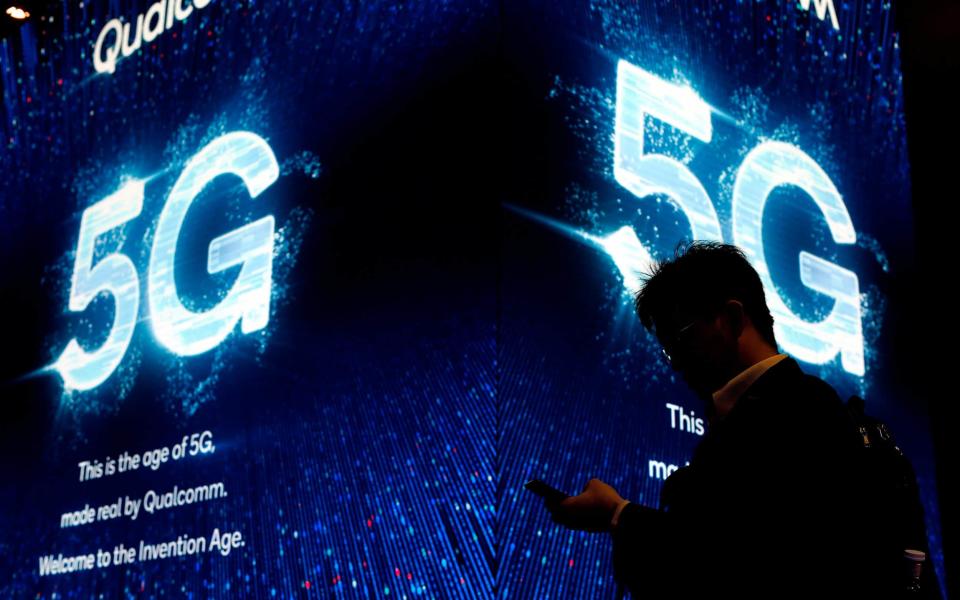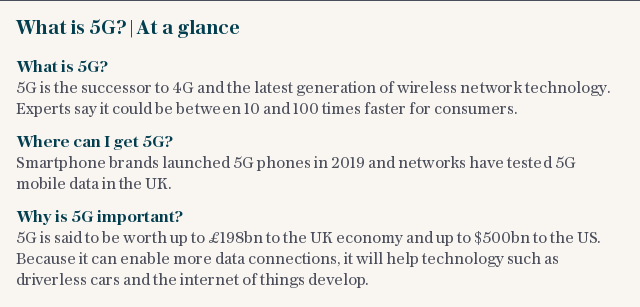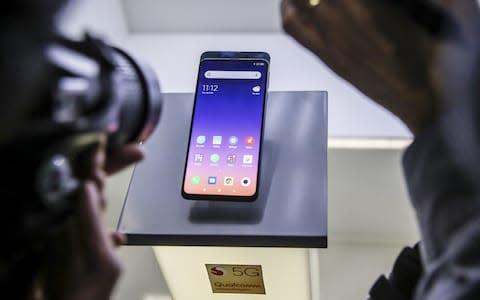What is 5G and how will it change your life?

A new generation of mobile and wireless technology is just around the corner. New 5G technology, a major upgrade on current 4G data connections, is set to arrive in the coming months and could launch on network services used by tens of millions of British consumers.
But the race to 5G has many concerned that the technology has been over-hyped, at least in its early form. It has led to legal battles and disputes, smartphone makers rushing to launch new handsets and even global security concerns over the equipment used to run the technology.
The latest news has revealed that EE will be the first UK network to launch 5G technology from 30 May in some cities, followed soon after by Vodafone. Smartphones from Samsung, OnePlus and Xiaomi are all set to be the first to feature the technology in the UK.
“5G will create new experiences with augmented reality, make our customers’ lives easier, and help launch entirely new businesses that we haven’t even imagined,” according to Marc Allera, head of BT's consumer division.
But what exactly is 5G and how will it be different from the current network. For those who struggle to get a 3G signal in their local area, will it actually make any difference?
Here is everything we know so far about 5G in the UK, and what you can expect to see in the coming months.
What is 5G?
5G is an evolution of current network technology, 4G, one that will enable download speeds between 10 and 100 times faster than current rates.
For most consumers, 5G will be most evident in the kind of content and speeds they can experience on their mobile phones. This will mean that 4K films will be able to download in a fraction of the time that they are now, or video games can be streamed online. Technologies like virtual reality will become more reliable and better connected.
5G does this by cutting down the latency, or delay time, through its more advanced network design. It is also needed to keep up with relentless consumer demand for data - which is going up 40pc per year.
But the technology goes further than just faster mobile network speeds. It will also be essential for enabling the development of new products and technology.
But also it will help link up new technologies to the internet. This could mean that medical technologies like remote surgery could take place over 5G networks, or driverless cars could operate connected to the 5G grid and factories could use 5G to operate more efficiently with remote robots.
“In a way, 5G can be seen as a bridge from mobile technology to other industry segments,” says says Enrico Salvatori, President of Europe at Qualcomm, a company making 5G microchips for smartphones.

When will 5G technology come to the UK?
Networks have finally started to confirm when their 5G technology launches will happen. EE's technology will go live in six cities on May 30, while Vodafone will launch its technology in a handful of locations in July.
How does 5G technology work?
5G works by opening up more wireless radio wave "spectrum" to consumers and businesses. Data is sent between devices or from networks to consumers over this network of radio masts, cables and antennas.
5G will be faster than 4G by adding significantly more radio spectrum at higher frequencies. In the UK, this will initially consist of the 3.4GHz - 3.8GHz spectrum, which has already been sold to network operators. Ofcom, the telecoms regulator, also plans to auction off ultra-high frequency of around 26GHz, 37-43.5GHz and 66-71GHz. This millimeter wave band will also help improve speeds.

Much of this will largely be built around the existing 4G network, but 5G will also bring more base stations closer to consumers. These new wireless stations will appear around major built up areas. These will include MIMO (multiple-input multiple-output) towers, as well as smaller boxes that could appear on buildings or lampposts to boost speeds in urban areas.
What will 5G mean for download speeds?
5G could, theoretically, boost download speeds to up to 10Gbps over mobile data. That is 100 times what is achievable on the current 4G network.
Of course, that is mostly proven under lab conditions, without the hundreds or thousands of devices that will be connected to base stations in the real world. Qualcomm has said that it would expect most consumers in areas of 5G coverage to experience between 10 and 20 times faster network speeds than are currently available.
Where can I get 5G?
Right now, you would have to be in one of a handful of pilot locations around the world in order to try out 5G. But it is going to be turned on very soon.
Vodafone, O2, EE and Three have all confirmed they will be trialing 5G technology in locations around the UK this year.
EE has said it will launch 5G trials in 16 cities. Its first six cities, which will go live on May 30, include Cardiff, Edinburgh, Belfast, Birmingham, London and Manchester. It will also be trialing 5G at Glastonbury Festival. Later this year it will launch 5G technology in Bristol, Coventry, Glasgow, Hull, Leeds, Leicester, Liverpool, Newcastle, Nottingham and Sheffield.
O2 will trial its technology in Belfast, Cardiff, Edinburgh and London (and at Millbrook, a driverless car test site)
Vodafone will launch 5G technology in July in Birmingham, Bristol, Cardiff, Glasgow, Manchester, Liverpool and London. It has said 5G sites will follow in Birkenhead, Blackpool, Bournemouth, Guildford, Newbury, Portsmouth, Plymouth, Reading, Southampton, Stoke-on-Trent, Warrington and Wolverhampton later this year.
Of course, these sites are not all likely to get switched on at once. We will update this page when we know more about where the first live 5G areas have gone live.
Can I use 5G on my mobile phone?
Unless you have come from the very near future or are beta-testing the very latest phones, probably not. A handful of 5G compatible phones have been announced, and they will be available very soon.
That is because for your mobile phone to use 5G, you will need specially designed modem chips that can pick up 5G signals. For the most part, these are being made by Qualcomm, with some designs being built by Huawei for its own devices.

Will my 4G phone work with 5G?
No, if your phone is only built for 4G or LTE connections it will not be able to benefit from 5G.
Which networks are launching 5G?
In the UK, Vodafone, O2, EE and Three will be launching with 5G. Worldwide, the likes of Verizon and AT&T are expected to dominate 5G in the US. Other global network like Deutsche Telekom and Orange will also launch 5G networks. The first network to launch a 5G service worldwide is Switzerland's SwissCom.
Are there security concerns about 5G technology?
While 5G is set to provide faster connectivity, it is not without its controversies. The launch of 5G technology has become embroiled in a debate over cyber security.
One of the leading companies building the world's 5G technology is Huawei. This Chinese company has come under scrutiny from the US government and security agencies over claims it is tied to the Chinese state, something Huawei has repeatedly denied. This has led to debate raging across Europe over whether countries should allow Huawei to build their 5G networks.
In some cases, Huawei is expected to participate, but with some limitations. In the UK, The Daily Telegraph reported that Britain would allow Huawei into the "non-core" part of the network, the part of the 5G network that should carry less sensitive information.
But some security concerns over 5G run deeper than just Huawei. Because 5G will create thousands more access points on the network, some of which will be connected to vital technologies like power stations or driverless cars, that will mean many more areas that can be attacked by hackers.
“There is an amplification,” Surrey University professor Alan Woodward, a former GCHQ adviser, told The Telegraph earlier this year. “5G will appear in a number of guises with the Internet of Things. You will move from having millions of devices to billions of devices.”
How much will 5G cost?
In the UK, the first network prices have been confirmed for 5G wireless technology. Vodafone has said it will keep 5G contracts on offer for the same price as current 4G versions. EE says its 5G Smart Plans will start from 10GB at £54 per month and cost up to £74 per month for 120GB of data.
In the US, Verizon says it will charge around $10 per month more for someone with a 5G contract. AT&T has said it will offer 5G as part of a $70 a month deal for 15GB of data.
The first 5G smartphones
5G is expected to come to a number of phones in 2019, although they will probably be quite limited in numbers and expensive in price. Here are some of the top ones we know so far.
Moto Z3 with 5G Mod - out now in the US
This phone is a beefed up version of Motorola's regular 4G model, which includes a clip-on 5G modification that will enable this phone the new network technology. It is only available in the US.
Xiaomi Mi Mix 3 5G - launches 23 May on Vodafone in the UK
A budget 5G phone, Xiaomi has proved that 5G won't just be for the most expensive flagship models. It will cost around €599 /£520 and will be available on Vodafone with 5G.
Samsung Galaxy S10 5G - launches 7 June
Samsung confirmed it will launch a 5G smartphone earlier this year and it will come to the UK on June 7. This boosted version of its current S10 will have some improved features and specs such as a 6.7-inch screen, a 4,500 mAh battery and four cameras on the rear.

LG V50 ThinQ - Spring 2019
This phone from South Korea's LG comes with a 6.4-inch screen, a 4,000mAh battery and 5G connectivity. It was slated to be released in April but is still not on sale.
Huawei Mate X - Autumn 2019
Huawei has confirmed its folding phone will come with 5G. This folding phone flips outwards, turning its front and rear screens into a phone with one, big 8-inch screen that can be used like a tablet.
Huawei Mate X 20 5G - launch date unknown
Huawei was hoping to launch this 7.2-inch smartphone on Vodafone's network in the coming months, but has seen its plans shelved after Google said it would no longer support Huawei with the Android operating system following a US sales ban.
Will there be a 5G iPhone?
Not this year, most analysts predict. Apple is expected to launch a 5G smart phone by 2020, having settled a $27bn legal dispute with Qualcomm over how much it was paying for using its patent designs. Qualcomm is now expected to build 5G modems for Apple - just don't expect them in the iPhone Xi.
